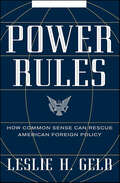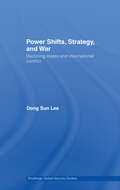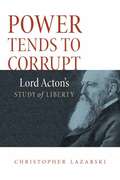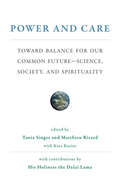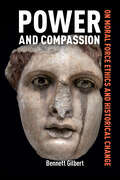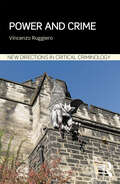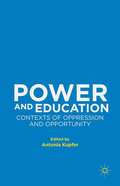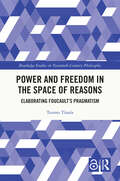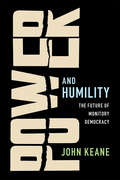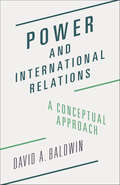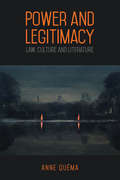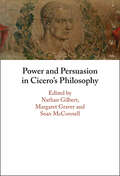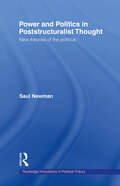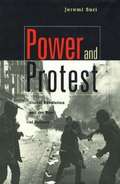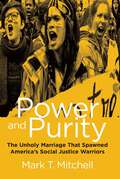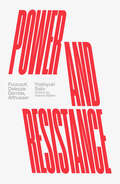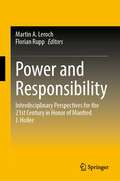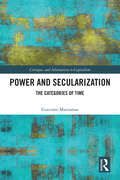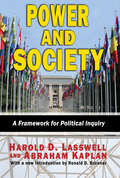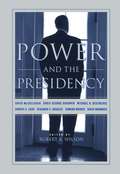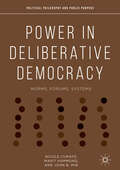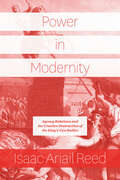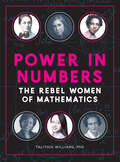- Table View
- List View
Power Rules: How Common Sense Can Rescue American Foreign Policy
by Leslie H. GelbA provocative account of how to think about and use America’s power in the world from a Pulitzer Prize winner and a leading foreign policy practitioner.“Fluent, well-timed, provocative. . . . Filled with gritty, shrewd, specific advice on foreign policy ends and means. . . . Gelb’s plea for greater strategic thinking is absolutely right and necessary.” —New York Times Book Review“Lively. . . . Power Rules is worth the read. . . . Gelb's career embodies big and powerful Washington, with all its turf battles, crises, and war stories. . . . These peeks behind the curtain reveal how personalities, insecurities, and even carven careerism can sometimes propel a nation's foreign policy, and its history, in new and unexpected directions.” —Washington Post“Leslie Gelb has as much experience in foreign policy as anyone alive. Unlike most writers in this field, he isn't afraid to use plain language and say what he means. He relishes hard truths. And he doesn't mind making powerful enemies. All of these are prerequisites to writing a modern Prince—which is what Gelb has done. I don't agree with all of it, but I greatly admire this handbook on the uses of American power in a complex age.” —New York Times–bestselling and National Book Award–winning author George Packer“Few Americans know the inner world of American foreign policy—its feuds, follies, and fashions—as well as Leslie H. Gelb. . . . Power Rules builds on that lifetime of experience with power and is a witty and acerbic primer.” —New York Times
Power Shifts, Strategy and War: Declining States and International Conflict (Routledge Global Security Studies)
by Dong Sun LeeMarked changes in the balance of power between states in the international system are generally seen by IR scholars as among the most common causes of war. This book explains why such power shifts lead to war breaking out in some cases, but not in others. In contrast to existing approaches, this book argues that the military strategy of declining states is the key determinant of whether power shifts result in war or pass peacefully. More specifically, Dong Sun Lee argues that the probability of war is primarily a function of whether a declining state possesses a ‘manoeuvre strategy’ or an ‘attrition strategy’. The argument is developed through the investigation of fourteen power shifts among great powers over the past two centuries. Shifts in the balance of power and the attendant risks of war remain an enduring feature of international politics. This book argues that policymakers need to understand the factors influencing the risk of war as a result of these changes, in particular the contemporary shifts in power resulting from the rise of China and from the growth of nuclear proliferation.
Power Tends To Corrupt: Lord Acton's Study of Liberty
by Christopher LazarskiLord Acton (1834–1902) is often called a historian of liberty. A great historian and political thinker, he had a rare talent to reach beneath the surface and reveal the hidden springs that move the world. While endeavoring to understand the components of a truly free society, Acton attempted to see how the principles of self-determination and freedom worked in practice, from antiquity to his own time. But though he penned hundreds of papers, essays, reviews, letters and ephemera, the ultimate book of his findings and views on the history of liberty remained unwritten. Reading a book a day for years he still could not keep pace with the output of his time, and finally, dejected, he gave up. Today, Acton is mainly known for a single maxim, Power tends to corrupt, and absolute power corrupts absolutely. In Power Tends to Corrupt, Christopher Lazarski presents the first in-depth consideration of Acton's thought in more than fifty years. Lazarski brings Acton's work to light in accessible language, with a focus on his understanding of liberty and its development in Western history. A work akin to Acton's overall account of the history of liberty, with a secondary look at his political theory, this book is an outstanding exegesis of the theories and findings of one of the nineteenth century's keenest minds.
Power and Care: Toward Balance for Our Common Future#Science, Society, and Spirituality (The\mit Press Ser.)
by Matthieu Ricard Tania Singer Kate KariusLeading thinkers from a range of disciplines discuss the compatibility of power and care, in conversation with the Dalai Lama.For more than thirty years, the Dalai Lama has been in dialogue with thinkers from a range of disciplines, helping to support pathways for knowledge to increase human wellbeing and compassion. These conversations, which began as private meetings, are now part of the Mind & Life Institute and Mind & Life Europe. This book documents a recent Mind & Life Institute dialogue with the Dalai Lama and others on two fundamental forces: power and care—power over and care for others in human societies.The notion of power is essentially neutral; power can be used to benefit others or to harm them, to build or to destroy. Care, on the other hand, is not a neutral force; it aims at increasing the wellbeing of others. Power and care are not incompatible: power, imbued with care, can achieve more than a powerless motivation to care; power, without the intention to benefit others, can be ruthless. The contributors—who include such celebrated figures as Frans B. M. de Waal, Olafur Eliasson, Sarah Blaffer Hrdy, and Jody Williams—discuss topics including the interaction of power and care among our closest relatives, the chimpanzees; the effect of meditation and mental training practices on the brain; the role of religion in promoting peace and compassion; and the new field of Caring Economics.ContributorsPaul Collier, Brother Thierry-Marie Courau, Frans B. M. de Waal, Olafur Eliasson, Scilla Elworthy, Alexandra M. Freund, Tenzin Gyatso (His Holiness the Dalai Lama), Markus Heinrichs, Sarah Blaffer Hrdy, Frédéric Laloux, Alaa Murabit, Matthieu Ricard, Johan Rockström, Richard Schwartz, Tania Singer, Dennis J. Snower, Rabbi Awraham Soetendorp, Theo Sowa, Pauline Tangiora, Jody Williams
Power and Compassion: On Moral Force Ethics and Historical Change
by Bennett GilbertThis book presents a theory of the morality of human relations deeply drawn from widespread spiritual traditions, offering an account of the full range of sociality that comprises our moral life. Bennett Gilbert argues that the dynamic character of our choices and actions is developed as the center of philosophical inquiry into ethics. Relying on the tradition of philosophical personalism, the author reads moral life in terms of the central worth and value of human personhood. This fully relational concept supports a picture of the clash and cooperation of two great moral forces, power and compassion. By combining hermeneutics, first-person philosophy, moral philosophy, and existential philosophy of history, Power and Compassion is a philosophical exploration of the ways in which we use our moral force to create meaningfulness in our collective experience.
Power and Crime (New Directions in Critical Criminology)
by Vincenzo RuggieroThis book provides an analysis of the two concepts of power and crime and posits that criminologists can learn more about these concepts by incorporating ideas from disciplines outside of criminology. Although arguably a 'rendezvous' discipline, Vincenzo Ruggiero argues that criminology can gain much insight from other fields such as the political sciences, ethics, social theory, critical legal studies, economic theory, and classical literature. In this book Ruggiero offers an authoritative synthesis of a range of intellectual conceptions of crime and power, drawing on the works and theories of classical, as well as contemporary thinkers, in the above fields of knowledge, arguing that criminology can ‘humbly’ renounce claims to intellectual independence and adopt notions and perspectives from other disciplines. The theories presented locate the crimes of the powerful in different disciplinary contexts and make the book essential reading for academics and students involved in the study of criminology, sociology, law, politics and philosophy.
Power and Education: Contexts of Oppression and Opportunity
by Antonia KupferEducation is a crucial influence early in life and is therefore inextricably linked with power. This book examines how education can limit opportunities and create social inequality as well as being an empowering force for good. Theoretical approaches on the relationship of power and education are discussed as are questions on power and knowledge.
Power and Freedom in the Space of Reasons: Elaborating Foucault’s Pragmatism (Routledge Studies in Twentieth-Century Philosophy)
by Tuomo TiisalaThis book argues that the received view of the distinction between freedom and power must be rejected because it rests on an untenable account of the discursive cognition that endows individuals with the capacity for autonomy and self-governed rationality. In liberal and Kantian approaches alike, the autonomous subject is a self-standing starting point whose freedom is constrained by relations of power only contingently because they are external to the subject’s constitution. Thus, the received view defines the distinction between freedom and power as a dichotomy. Michel Foucault is arguably the most important critic of that dichotomy. However, it is widely agreed that Foucault falls short of justifying the alternative view he develops, where power and freedom are essentially entangled instead. The book fills out the gap by investigating the social preconditions of discursive cognition. Drawing on pragmatist-inferentialist resources from the philosophy of language (Wittgenstein, Sellars, and Brandom), it presents a new interpretation of Foucault’s philosophy that is unified by his overlooked idea of “the archaeology of knowledge.” As a result, the book not only explains why and how power and freedom must be entangled but also what it means ethically to pursue and gain autonomy with respect to one’s own understanding. Power and Freedom in the Space of Reasons will appeal to scholars and advanced students working in social and political philosophy, critical theory, ethics, philosophy of language, and the history of 20th-century philosophy.The Open Access version of this book, available at www.taylorfrancis.com, has been made available under a Creative Commons Attribution-Non Commercial (CC-BY-NC) 4.0 license.Any third party material in this book is not included in the OA Creative Commons license, unless indicated otherwise in a credit line to the material. Please direct any permissions enquiries to the original rightsholder.This research was funded in whole or in part by the Austrian Science Fund (FWF) [10.55776/COE3]. For open access purposes, the author has applied a CC BY-NC public copyright license to any author-accepted manuscript version arising from this submission.Published with the support of the Austrian Science Fund (FWF): 10.55776/PUB1157
Power and Humility: The Future of Monitory Democracy
by John KeaneDemocracy urgently needs re-imagining if it is to address the dangers and opportunities posed by current global realities, argues leading political thinker John Keane. He offers an imaginative, radically new interpretation of the twenty-first-century fate of democracy. The book shows why the current literature on democracy is failing to make sense of many intellectual puzzles and new political trends. It probes a wide range of themes, from the growth of cross-border institutions and capitalist market failures to the greening of democracy, the dignity of children and the anti-democratic effects of everyday fear, violence and bigotry. Keane develops the idea of 'monitory democracy' to show why periodic free and fair elections are losing their democratic centrality; and why the ongoing struggles by citizens and their representatives, in a multiplicity of global settings, to humble the high and mighty and deal with the dangers of arbitrary power, force us to rethink what we mean by democracy and why it remains a universal ideal.
Power and International Relations: A Conceptual Approach
by David A. BaldwinContrary to conventional wisdom, the concept of power has not always been central to international relations theory. During the 1920s and 30s, power was often ignored or vilified by international relations scholars—especially in America. Power and International Relations explores how this changed in later decades by tracing how power emerged as an important social science concept in American scholarship after World War I. Combining intellectual history and conceptual analysis, David Baldwin examines power's increased presence in the study of international relations and looks at how the three dominant approaches of realism, neoliberalism, and constructivism treat power.The clarity and precision of thinking about power increased greatly during the last half of the twentieth century, due to efforts by political scientists, psychologists, sociologists, economists, philosophers, mathematicians, and geographers who contributed to "social power literature." Baldwin brings the insights of this literature to bear on the three principal theoretical traditions in international relations theory. He discusses controversial issues in power analysis, and shows the relevance of older works frequently underappreciated today.Focusing on the social power perspective in international relations, this book sheds light on how power has been considered during the last half century and how it should be approached in future research.
Power and Legitimacy
by Anne QuémaAn interdisciplinary analysis of the ways in which symbolic acts create social norms, Power and Legitimacy is an important contribution to the growing body of scholarship on law and literature. Drawing on the theoretical insights of Judith Butler and Pierre Bourdieu, Anne Quéma demonstrates the effect of symbolic violence on the creation of social and political legitimacy.Examining modern jurisprudence theory, statutory law, and the family within the modern Gothic novel, Quéma shows how the forms and effects of political power transform as one shifts from discourse to discourse. An impressive integration of the scholarship in these three fields, Power and Legitimacy is a thought-provoking analysis of the basis of power and the law.
Power and Persuasion in Cicero's Philosophy
by Sean Mcconnell Margaret Graver Nathan GilbertExtensively trained as a philosopher, Cicero was also a working politician with a keen awareness of the distance between pure intellectual endeavor and effective strategies of persuasion. This volume explores a series of interrelated problems in his works, from the use of emotion, self-correction, and even fiction in intellectual inquiry, to the motives of political agents and the morality of political arguments, to the means of justifying the use of force in international relations. It features close readings of works from all periods of Cicero's philosophical career, from the threshold of Rome's civil war to the year following the assassination of Julius Caesar. For a richer body of evidence, the volume also makes use of material from Cicero's personal letters and political speeches. Power and Persuasion in Cicero's Philosophy will be essential reading not only in Roman philosophy but also for the political and rhetorical culture of the Roman Republic.
Power and Politics in Poststructuralist Thought: New Theories of the Political (Routledge Innovations in Political Theory #Vol. 17)
by Saul NewmanThis book explores the impact of poststructuralism on contemporary political theory by focussing on problems and issues central to politics today. Drawing on the theoretical concerns brought to light by the ‘poststructuralist’ thinkers Foucault, Derrida, Lacan, Deleuze and Max Stirner, Newman provides a critical examination of new developments in contemporary political theory: post-Marxism, discourse analysis, new theories of ideology and power, hegemony, radical democracy and psychoanalytic theory. He re-examines the political in light of these developments in theory to suggest new ways of thinking about politics through a reflection on the challenges that confront it. This volume will be of great interest to students of postmodernism and poststructuralist theory in political science, philosophy, sociology, philosophy and cultural studies.
Power and Progress: International Politics in Transition (Security and Governance)
by Jack SnyderJack Snyder is a leading American international relations scholar with an international reputation for his research on IR theory and US Foreign policy. This book collects many of his most important essays into a single volume. Exploring a liberal realist theory of international politics, the book is arranged around three key subject areas: Anarchy and Its Effects The Challenges of Democratic Consolidation Empire and the Promotion of a Liberal Order With a new introduction to frame the selected essays, this collection examines how developing nations evolve political systems, and fit into a world dominated by liberal-democracies. It looks to the future for the current dominant powers in a changing world of international relations and at the challenges to their leadership. Featuring a new conclusion, developed from the assembled chapters, this is a fascinating and vital collection of scholarship from one of the most influential theorists of his generation. Power and Progress is an invaluable text for students and scholars of international relations, and those interested in the debates on liberalism and realism, and comparative politics.
Power and Protest
by Jeremi SuriJeremi Suri puts the tumultuous 1960s into a truly international perspective in the first study to examine the connections between great power diplomacy and global social protest.
Power and Purity: The Unholy Marriage that Spawned America's Social Justice Warriors
by Mark T. MitchellToday's social justice movement is rooted in a toxic combination of what Nietzsche called &“the will to power&” and Puritanism, which manifests itself in self-righteous moral absolutism. For Nietzsche, life is nothing but the will to power: the attempt to assert oneself against others who are motivated by the same headlong drive. The Puritan is motivated by a quest for moral and political purity. It is impossible to adequately grasp the revolutionary impulses of the radical left today without taking into account the complex dynamics of this rather surprising union. This compelling and thoroughly original analysis of the social justice movement will change the way history records the development and effects the movement.
Power and Resistance: Foucault, Deleuze, Derrida, Althusser
by Yoshiyuki SatoProposes a provocative reinterpretation of poststructuralist theory of powerThe &“structuralist&” theories of power show that the subject is produced and reproduced by the investment of power: but how then can we then think of the subject&’s resistance to power? Based on this fundamental question, Power and Resistance interprets critically the (post-)structuralist theory of power and resistance, i.e., the theories of Foucault, Deleuze and Guattari, Derrida and Althusser. It analyses also the mechanism of power and the strategies of resistance in the era of neoliberalism. This meticulous analysis that completely renewed the theory of power is already published in French, Japanese, and Korean with success.
Power and Responsibility: Interdisciplinary Perspectives for the 21st Century in Honor of Manfred J. Holler
by Florian Rupp Martin A. LerochWritten by leading scholars from various disciplines, this book presents current research on topics such as public choice, game theory, and political economy. It features contributions on fundamental, methodological, and empirical issues around the concepts of power and responsibility that strive to bridge the gap between different disciplinary approaches. The contributions fall into roughly four sub-disciplines: voting and voting power, public economics and politics, economics and philosophy, as well as labor economics.On the occasion of his 75th birthday, this book is written in honor of Manfred J. Holler, an economist by training and profession whose work as a guiding light has helped advance our understanding of the interdisciplinary connections of concepts of power and responsibility. He has written many articles and books on game theory, and worked extensively on questions of labor economics, politics, and philosophy.
Power and Secularization: The Categories of Time (Critiques and Alternatives to Capitalism)
by Giacomo MarramaoThis book offers a geneaological understanding of the condition of our time by reconstructing the complex story of the transition from the "cyclical time" of the classic era to the "linear and infuturant time" of the modern world. Time is therefore understood not as a simple vector, but as a trans-political form par excellence, which involves the fundamental philosophical and political categories of the modern constellation: beginning with the concepts of progress, revolution, liberation, and alternative.Arguing that the process of secularization (in its broadest sense) is dependent on the modern notion of cumulative and irreversible time—together with the temporalization of history—Power and Secularization constitutes a conceptual history that will appeal to scholars of social and political theory and philosophy with interests in intellectual history and the genealogical method.
Power and Society: A Framework for Political Inquiry (International Library Of Sociology Ser. #Vol. 17)
by Harold D. LasswellIn Power and Society, Harold D. Lasswell collaborates with a brilliant young philosopher, Abraham Kaplan, to formulate basic theoretical concepts and hypotheses of political science, providing a framework for further inquiry into the political process. This is a classic book of political theory written by two of the most influential social scientists of the twentieth century.The authors find their subject matter in interpersonal relations, not abstract institutions or organizations, and their analysis of power is related to human values. They argue that revolution is a part of the political process, and ideology has a role in political affairs. The importance of class, both as social fact and social symbol, is reflected in their detailed analysis, and emphasis on merit rather than rank, skill rather than status, as keystones of democratic rule.The authors note that power is only one of the values and instruments manifested in interpersonal relations; it cannot be understood in abstraction from other values. Lasswell and Kaplan call for the replacement of "power politics," both in theory and in practice, by a conception in which attention is focused on the human consequences of power as the major concern of both political thought and political action. The basic discussions of core concepts in political science make Power and Society of continuing importance to scholars, government officials, and politicians.
Power and the Presidency
by Robert A. WilsonThis sterling collection of original, never-before-published essays on six fascinating contemporary presidents by some of the leading presidential biographers of our time is must reading for anyone interested in American politics, the history of the American presidency, or the lives of the presidents. Each essay-extending and elaborating on lectures originally delivered as part of the Montgomery Lecture Series at Dartmouth University-explores how a particular president came to power, wielded power, and was changed by power, and how each presidency affected the power of the office itself. The presidencies addressed are those of Roosevelt, Eisenhower, Kennedy, Johnson, Reagan, and Clinton. Published as our nation begins the process of electing the 43rd president, during a time when some believe the independence of the office itself is at stake, Power and the Presidency is a timely and thought-provoking look at the nature of power in American democracy.
Power in Deliberative Democracy: Norms, Forums, Systems (Political Philosophy and Public Purpose)
by Nicole Curato Marit Hammond John B. MinDeliberative democracy is an embattled political project. It is accused of political naiveté for it only talks about power without taking power. Others, meanwhile, take issue with deliberative democracy’s dominance in the field of democratic theory and practice. An industry of consultants, facilitators, and experts of deliberative forums has grown over the past decades, suggesting that the field has benefited from a broken political system.This book is inspired by these accusations. It argues that deliberative democracy’s tense relationship with power is not a pathology but constitutive of deliberative practice. Deliberative democracy gains relevance when it navigates complex relations of power in modern societies, learns from its mistakes, remains epistemically humble but not politically meek. These arguments are situated in three facets of deliberative democracy—norms, forums, and systems—and concludes by applying these ideas to three of the most pressing issues in contemporary times—post-truth politics, populism, and illiberalism.
Power in Modernity: Agency Relations and the Creative Destruction of the King’s Two Bodies
by Isaac Ariail ReedIn Power in Modernity, Isaac Ariail Reed proposes a bold new theory of power that describes overlapping networks of delegation and domination. Chains of power and their representation, linking together groups and individuals across time and space, create a vast network of intersecting alliances, subordinations, redistributions, and violent exclusions. Reed traces the common action of “sending someone else to do something for you” as it expands outward into the hierarchies that control territories, persons, artifacts, minds, and money. He mobilizes this theory to investigate the onset of modernity in the Atlantic world, with a focus on rebellion, revolution, and state formation in colonial North America, the early American Republic, the English Civil War, and French Revolution. Modernity, Reed argues, dismantled the “King’s Two Bodies”—the monarch’s physical body and his ethereal, sacred second body that encompassed the body politic—as a schema of representation for forging power relations. Reed’s account then offers a new understanding of the democratic possibilities and violent exclusions forged in the name of “the people,” as revolutionaries sought new ways to secure delegation, build hierarchy, and attack alterity. Reconsidering the role of myth in modern politics, Reed proposes to see the creative destruction and eternal recurrence of the King’s Two Bodies as constitutive of the modern attitude, and thus as a new starting point for critical theory. Modernity poses in a new way an eternal human question: what does it mean to be the author of one’s own actions?
Power in Numbers: The Rebel Women of Mathematics
by Talithia WilliamsFrom rocket scientists to code breakers, “fascinating stories” of women who overcame obstacles, shattered stereotypes, and pursued their passion for math (Notices of the American Mathematical Society).With more than 200 photos and original interviews with several of the amazing women covered, Power in Numbers: The Rebel Women of Mathematics is a full-color volume that puts a spotlight on the influence of women on the development of mathematics over the last two millennia. Each biography reveals the life of a different female mathematician, from her childhood and early influences to the challenges she faced and the great achievements she made in spite of them. Learn how:After her father terminated her math lessons, Sofia Kovalevskaya snuck algebra books into her bed to read at nightEmmy Noether became an invaluable resource to Albert Einstein while she was in the NavyNative American rocket scientist Mary Golda Ross developed designs for fighter jets and missiles in a top-secret unitKatherine Johnson’s life-or-death calculations at NASA meant that astronauts such as Alan Shepard and John Glenn made it home aliveShakuntala Devi multiplied massive numbers in her head so her family could eat at nightPamela Harris proved her school counselors wrong when they told her she would only succeed as a bilinguial secretaryCarla Cotwright-Williams began her life in the dangerous streets of South-Central Los Angeles before skyrocketing to a powerful career with the Department of Defense in Washington, DCThese women are a diverse group, but their stories have one thing in common: At some point on their journeys, someone believed in them—and made them think the impossible was perhaps not so impossible.“A quick read . . . full of dramatic stories and eye-catching illustrations.” —MAA Reviews“I found myself marveling at the personal anecdotes and quotes throughout the book.” —Notices of the American Mathematical Society
